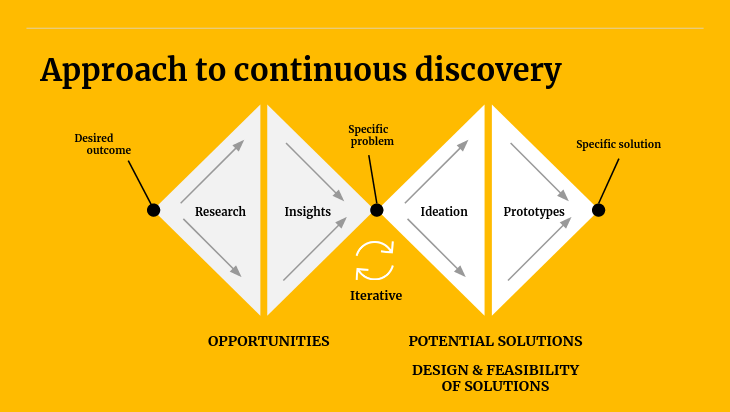Continuous discovery workshop
I run a workshop for product teams who are interested in getting better at experimenting and learning.
Attendees have included individuals and product teams from Whitbread, Tangent, USwitch, Aviva and more.
Why learn about continuous discovery?
Has your team ever spent ages polishing a new product or feature, only to see users ignore it after release?
Or maybe your team is bursting with new ideas that you’d love to test on users, but you’re not sure which to prioritise – or whether you can even afford to spend time on testing and learning.
Establishing a ‘continuous discovery’ track on your team can help. Spending a percentage of your time rapidly learning and experimenting as a team has great benefits – if your ideas are doomed to fail, you’ll know sooner; the data you collect will help you prioritise and make better product decisions; and the whole team will feel happier, more empowered, and closer to your users along the way.
This is a way of working that lots of product teams aspire to – but how do you actually pull it off, when you’re also busy working your way through a backlog and answering to stakeholders?
How my workshop can help
I have a track record of successfully implementing continuous discovery on teams. In the first part of this hands-on workshop, you’ll learn how to lay the groundwork for setting it up on your team. Involving the whole team – product, UX and developers – is key, and you’ll get advice on how best to unite the team and start collaborating to solve problems and test your ideas.

In the second part, we’ll dig deeper into how to shift your team’s mindset to one of ‘testing your assumptions’ – an important skill for teams who want to do continuous discovery. We’ll teach you how to identify the risky ‘make or break’ assumptions behind your product and feature ideas, and how to devise quick and easy experiments to test whether those assumptions are true. You’ll leave with ideas for simple, lean experiments you can run tomorrow to quickly and easily learn whether your product and feature ideas have legs.
Before you go, we’ll also troubleshoot any blockers your team might encounter, to make it easier to get your new experiments up and running.
What you’ll learn
- Get an understanding of continuous discovery and why it’s important
- Tips and tricks for getting a discovery track started on your team
- Why collaboration is key to discovering and delivering successful products
- How to identify make or break assumptions at key stages of the discovery process, and how to devise quick tests to prove or disprove them
- How to facilitate an assumptions and tests workshop
- Best practices for running your tests
- How to get buy in for assumptions testing from stakeholders
You’ll also leave with...
- Ideas for what solutions your team should be testing first
- Simple, lean experiments you can run tomorrow to see whether your solutions have legs
- A reading list and technique cards to help your team carry on after the workshop
What attendees say
“For me the key learning was the usefulness of testing assumptions rather than fully developed ideas. I can see this saving a lot of time and effort.”
“I enjoyed listening to examples of how the tutors applied this methodology in their professional projects.”
“The hands-on approach was great. I think you struck a nice balance of theory and doing tasks.”
“I really enjoyed doing this - it helped designers/product owners/developers understand each others’ problems.”
Interested in attending?
Please get in touch! I’m happy to discuss running this workshop for your product team or organisation.
Case studies
Case studies